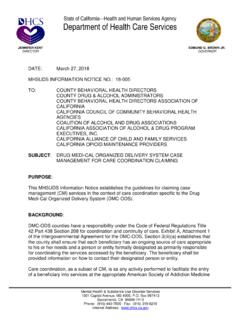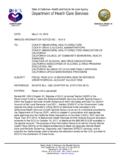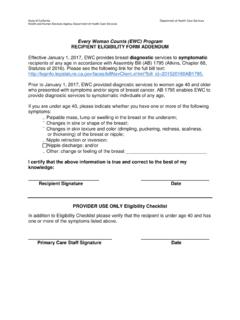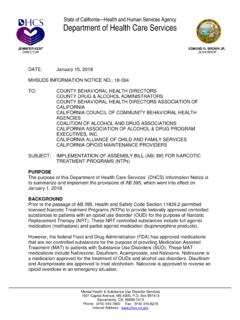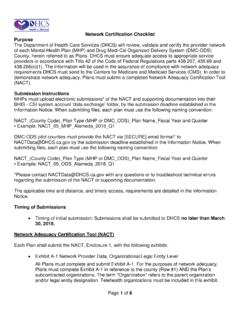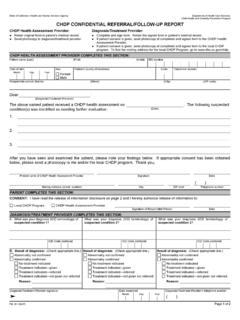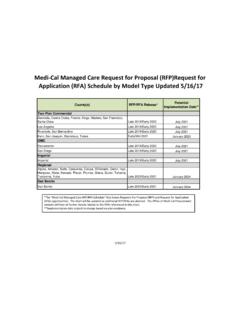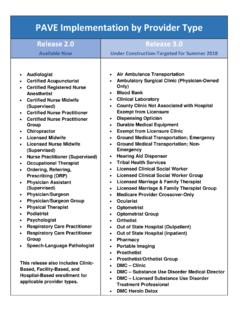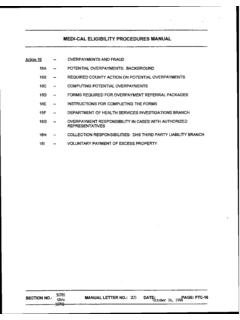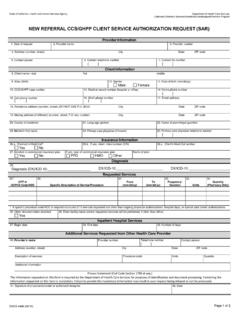Transcription of 2011-12 Governor’s Budget - California …
1 2018-19 governor 's Budget Highlights Department of health Care Services EDMUND G. BROWN JR. governor . State of California Diana S. dooley Secretary California health and Human Services Agency Jennifer Kent Director Department of health Care Services January 10, 2018. California DEPARTMENT OF health CARE SERVICES PROGRAM OVERVIEW. The California Department of health Care Services' (DHCS) mission is to provide Californians with access to affordable, integrated, high-quality health care including medical, dental, mental health , substance use treatment services, and long-term care. Our vision is to preserve and improve the overall health and well-being of all Californians. DHCS helps provide Californians access to quality health care services that are delivered effectively and efficiently. Its programs integrate all spectrums of care primarily via Medi-Cal, California 's Medicaid program. Medi-Cal is a federal/state partnership providing comprehensive health care to individuals and families who meet defined eligibility requirements.
2 Medi-Cal coordinates and directs the delivery of important services to approximately million Californians. On January 1, 2014, California implemented the Medi-Cal expansion which extended eligibility to adults without children and parent and caretaker relatives with incomes up to 138 percent of the federal poverty level. This expansion and other program changes since 2013 have increased Medi-Cal enrollment by 5 million individuals. In addition to Medi-Cal, the Department offers programs to special populations: Low-income and seriously ill children and adults with specific genetic diseases. The various programs include the Genetically Handicapped Persons Program, California Children's Services Program, and Newborn Hearing Screening Program. Californians in rural areas and to underserved populations including Indian health , the Rural health Services Development Program, the Seasonal Agricultural and Migratory Workers Program, the State Office of Rural health , the Medicare Rural Hospital Flexibility Program /.
3 Critical Access Hospital Program, the Small Rural Hospital Improvement Program, and the J-1. Visa Waiver Program. Community mental health services and substance use disorder services funded by federal block grants, the Mental health Services Act and other funding. Public health prevention and treatment programs. These services are provided via the Every Woman Counts Program, the Prostate Cancer Treatment Program and the Family Planning Access Care and Treatment Program. 2. GENERAL Budget OVERVIEW. The Budget for DHCS supports actions and vital services that reinforce the State's commitment to protect and improve the health of all Californians. For Fiscal Year (FY) 2018-19, the governor 's Budget presents a total of $ billion for the support of DHCS programs and services. Of that amount, $685. million funds state operations, while $ billion supports local assistance. The proposed Budget attempts to affirm the State's commitment to address the health care needs of Californians while operating within a responsible budgetary structure.
4 Total DHCS Budget (includes non- Budget Act appropriations). 2017-18. 2017-18 2018-19. Approved Revised Budget Proposed Budget governor 's Budget Fund Source* Budget General Fund $19,992,321 $20,514,661 $21,862,524. Federal Funds $69,664,489 $64,466,719 $67,921,295. Special Fund & Reimbursements $20,344,119 $18,298,528 $14,759,646. Total Funds $110,000,929 $103,279,908 $104,543,465. *Dollars in thousands State Operations State Operations by Fund Source *. 2017-18 2017-18 2018-19. governor 's Budget Fund Source Approved Budget Revised Budget Proposed Budget General Fund $209,741 $220,828 $219,075. Federal Funds $388,4142 $399,920 $414,138. Special Funds & Reimbursements $58,703 $58,649 $52,061. Total State Operations $656,858 $679,397 $685,274. *Dollars in thousands Local Assistance Local Assistance by Fund Source *. 2017-18 2017-18 2018-19. governor 's Budget Fund Source Approved Budget Revised Budget Proposed Budget General Fund $19,782,580 $20,293,833 $21,643,449.
5 Federal Funds $69,276,075 $64,066,799 $67,507,157. Special Funds & Reimbursements $20,285,416 $18,239,879 $14,707,585. Total Local Assistance $109,344,071 $102,600,511 $103,858,191. *Dollars in thousands 3. MAJOR PROPOSALS AND ISSUES. Home health Rate Increase As a result of DHCS' ongoing fee-for-service (FFS) access monitoring, the Department is proposing to adjust the rates for home health services provided through our FFS system and home and community based waivers. The Department is proposing a fifty percent (50%) increase to home health services rates in these two specified delivery systems, effective July 1, 2018, pending approval of federal financial participation by the Centers for Medicare and Medicaid Services (CMS). The governor 's Budget assumes $ million total funds ($ million Prop 56 funds) for this increase in FY18-19. Proposition 56. As noted in the governor 's Budget , the FY18-19 Budget proposes an increase of approximately $232.
6 Million in Proposition 56 funding for supplemental payments for dental and physician services, and maintains the supplemental payment or rate increases for all other affected providers (ICF-DD, HIV/AIDS Waiver and Women's health Services). The total FY18-19 Proposition 56 funding for these providers, including the increase for doctors and dentists, is $ million. The Department estimates the total funding (both federal and Proposition 56) in FY17-18 for these payments is $1,147 million and in FY18-19 is $2,025 million. As noted in the governor 's Budget , the Department plans to analyze the impact of the FY17-18. payment changes and may modify or revise the methodologies for payments for services beginning in the Budget year. If these payments are not demonstrating the intent of improving access to services for Medi-Cal beneficiaries, the Administration will work with the Legislature to modify the supplemental payments. In addition, the Budget also includes $ million in FY18-19 to support new growth in Medi-Cal expenditures compared to the 2016 Budget Act.
7 Medi-Cal County Administration The Department is proposing to increase the allocation for county administration of the Medi-Cal program to $ billion in FY18-19. This proposal will provide an interim funding methodology for county administration activities for the Medi-Cal program while DHCS works with the counties, the County Welfare Director's Association, and the Department of Finance to develop the best mechanism to fund these activities in the future. The proposed amount combines the current-year base appropriation of $ billion with the $ million appropriated for implementation of the Affordable Care Act at the county level. The two items were separate appropriations in previous budgets. In addition to combining the two items, DHCS is proposing a cost-of-doing-business adjustment for counties in FY18-19. The amount of the increase is $ million based on the projected Consumer Pricing Index of for FY18-19. In addition to the funding increase, the Department will be working with the counties to improve county performance in processing timely eligibility determinations and annual renewals, and for county data metrics to be more readily available for state and federal review.
8 Children's health Insurance Program (CHIP). As noted in the governor 's Budget , at the time the Budget was being developed, Congress had not yet reauthorized CHIP for the Federal Fiscal Year 2018 that began October 1, 2017. Therefore, the Budget reflects costs that assume CHIP reauthorization at the historical CHIP federal matching percentage of 65%, effective January 1, 2018 instead of the current enhanced CHIP matching rate of 88%. However, Congress has since included additional funding for CHIP that is projected to provide California with sufficient funding at the 88% matching rate likely through the end of March 2018. The May Revision 4. will make appropriate adjustments to reflect these changes and, as necessary and appropriate, any subsequent action or lack of action taken by Congress in regards to CHIP. 340B Drug Billing Requirements Trailer Bill In 2014, the Office of Inspector General for the Department of health and Human Services published findings that showed an inconsistency in the identification of 340B program eligible prescriptions resulting in duplicative discounts without any process in place that would identify improper multiple discounts.
9 There continues to be scrutiny and concern around the implementation of the 340B program across the nation. To comply with existing federal requirements, the Department is proposing trailer bill related to the use of, and reimbursement for, drugs purchased under the 340B program in Medi-Cal. The Department continues to have significant concerns regarding the use of the 340B program within Medi-Cal and the resulting costs and administrative burden it places on the state. Existing statute requires 340B entities that provide drugs to Medi-Cal beneficiaries to use only drugs purchased under the 340B program and bill at their actual 340B acquisition cost plus any applicable dispensing fee. Although this is required in Medi-Cal fee-for-service under existing statute, the Department is aware of instances in the fee-for-service program in which this is not occurring, particularly when the use of contracting pharmacies is involved.
10 In addition, based on discussions with various stakeholders, the Department understands that 340B entities are not billing their acquisition cost to Medi-Cal managed care plans and are instead billing a higher price, creating higher managed care pharmacy costs and therefore higher state costs. The Department has also noted in both fee-for-service and managed care that 340B drugs are not being correctly identified on claims to prevent inaccurate rebate billing that can jeopardize drug rebates with manufacturers. To address these issues, the Department's proposed trailer bill seeks to prohibit the use of 340B drugs in the Medi-Cal program, which will enable the state to comply with existing federal law and eliminate the unnecessary higher costs being paid through Medi-Cal as well as the substantial administrative burden of ensuring 340B entities are appropriately following existing law and regulation. The trailer bill proposes to make this effective no sooner than July 1, 2019.
